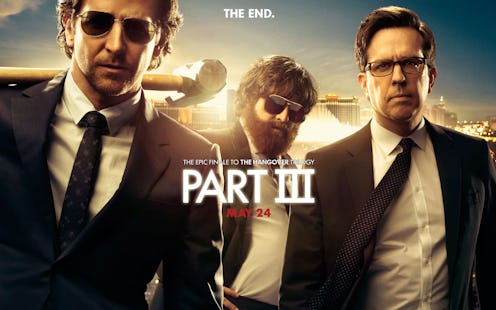Entertainment
Thanks to Sequel Culture, Are Movies the New TV?

I've been huge Tolkien fan ever since I acted out Eowyn slaying the Witch-king of Angmar in my room at the tender age of 11. I mean, I don't know Elvish or anything, but I made it halfway through The Silmarillion, which was hella dry, so that counts for something. So you better believe that when The Hobbit came out, I headed to the box office ASAP. But two hours into the movie, I started to panic a little. Where was Smaug? They weren't even in Mirkwood yet! What gives?
Tricked again by the Hollywood sequel. If done well, sequels only spur on your anticipation for the next chapter. If overused, they can become frustrating — which is what happened with The Hobbit. A 300-page children's novel split into three parts? That's more excessive than all the gold Smaug had stashed in the Lonely Mountain. (It was a lot, okay?)
But these days, more movies seem to be adding sequels without rhyme or reason. Brad Pitt has hinted at a trilogy split-up for the novel World War Z. Robert Downey Jr. has just signed on to Avengers movies 2 and 3. Sony decided to make a sequel for the movie Bad Teacher because, well, why the hell not?
While it may not make much sense as far as telling a story goes, it certainly makes a lot of business sense. Although 2012 was a good year for movies in comparison to the previous year, in the past 6 years, fewer people have been heading to the theatres. Over a third of population of the U.S. and Canada never stepped in a movie theatre last year, while in 2006, that figure hovered around a fourth of the population. Why spend the money on gas and a ticket when a movie will show up on Netflix in a matter of months?
And when times get tough, studios tend to play it safe. So it seems that they've decided to take a lesson from television and stick with popular names that audiences recognize. More spinoffs, more sequels, more cliffhangers. Now that studios have discovered that audiences love comic book adaptations, they have the whole Marvel and DC universes to adapt. And even if movies are made for every superhero down to Ant-Man, there's still an infinite number of re-boots and sequels for each one — just take a look at The Amazing Spider-Man.
But there's a time for another chapter, and there's a time to close the book. There's a reason why the cliffhanger formula normally works so well for television: the run time is shorter, and the turnaround time is too. If studios continue to make movies less of stand-alone ventures and more like series-long events, audiences could get tired of waiting for the story to play out. With unexpected sequels and trilogies, it becomes quickly self-evident that the story doesn't have enough heft to stretch over six hours of time. Take The Hangover 3: its box office numbers couldn't match those of the sequel, even overseas. Sequels that are just faded echoes of the original may earn some money off of name recognition alone, but they'll rarely be able to match the earnings of their predecessors.
As for me and The Hobbit? As much as I love to devour anything that comes from the land of Middle Earth, I doubt I'll see The Hobbit: The Desolation of Smaug when it comes to theatres. I'd rather re-read the books than watch a watered-down, bloated, cinematic version of original.